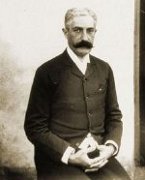




|
Giovanni
Verga
(1840-1922)
 Sicilian realist writer
who wrote his famous works in the late 1800s and early 1900s.
Born in Catania, he spent a large part of his
life in northern Italy. Most of his writings
deal with his native island and it's people, portraying them
with realism and with a special focus on the downtrodden.
Novels
I Malavoglia or The House by the Medlar Tree (1881): 255 pages. The first two pages of this novel contain a "cast of characters" much like that of a play, which you normally don't see in a novel. The reason for this is that the novel describes a small Sicilian town as a whole, i.e. the town and it's many varied residents, although it does focus on one family, the Malavoglia family. Thus this is more a novel of a collectively, of a mass of people, of a community rather than the normal "individualistic" novels which focus almost entirely on one person or a few people. I Malavoglia is placed in the small port town of Aci Trezza in east Sicily in the mid-1800's: it was a very small town, to this day it's population is only 5,000. The main focus of the novel is a poor fishing family and their continuous and often futile attempts to survive. Verga portrays the suffering and struggles of the Malavoglia family, and of the lower class of Aci Trezza as a whole, in a vivid and realistic manner, and he doesn't fall prey to reinforcing the myth that if you work hard enough you will become rich. In fact, this novel attacks that myth, as the Malavoglias work very hard, but never really improve their lot, and some members of the family give up working completely and turn to "illegal" activities because they are sick of the never ending work and poor conditions. Verga also attacks credit and shows the detrimental effect of a loan on the Malavoglia family. One of the greatest realist novels written, it is politically radical because it shows the truth of the conditions and life of the lower classes without distortion or embellishment. Mastro-don Gesualdo (1889): 328 pages. The second of a planned series of five novels which Verga had intended to write, it was the last major work he wrote. It starts with a long character list at the beginning like a play, and deals with a wide array of characters, although it's main focus is on Mastro-don Gesualdo. Don Gesualdo, formerly a peasant, rose to the top of society in Vizzini (a small town near Catania), and marries into a formerly wealthy aristocratic family. This novel is the opposite face of I Malavoglia; it shows what is really necessary for a lower class person to rise to wealth: suppression of emotions, marrying for materialistic reasons, disowning those you loved if they are a liability, and infinite greed and callousness. It also takes the attack to the end: what is the purpose of doing all this repulsive, reprehensible activity? Will the rich man be buried with his money? Will the money look after him and love him in his old age and times of rest or danger? Verga portrays Gesualdo, a typical nouveau riche, with realism and without covering up the reprehensible acts that are necessary for one to rise to wealth. Also a picture of a small society in economic transition, with the older aristocratic class dying out or else adapting themselves to new economic ideas and means of accumulating wealth. Short Stories Across the Sea Bindweed's Lover Black Bread Crackpot Don Licciu Papa: This story attacks the repressive foundation and support of the capitalist state, i.e. laws, courts, and "law” enforcement. This short quote from the story best explains what it is about: “Law is made for them who've got money to spend.” His Reverence Jeli the Herdboy Liberty: about a small rural town's (Bronte) revolt after Garibaldi landed in Sicily. Not only does this work depict a minor revolution of the peasants and the poor, it also shows how empty bourgeois nationalism is for the lower class, for freedom from foreign domination may improve the lot of the lower classes, but in the end bourgeois nationalism will inevitably perpetuate the subjugation of the lower classes, and oppose genuine class struggle. Malaria Nasty Foxfur: An excellent portrayal of how capitalism turns workers into beasts of burden, brutalizes them and turns them against each other. The main character of this story "Foxfur" is continually described and alluded to as animal-like, which is simply the result of his constant exploitation and the back-breaking manual labor he has been forced to perform since his early youth. This story also shows very clearly how capitalist oppression turns members of the revolutionary class against each other, brutalizes them, and promotes violent tensions between them. Also, we see that "Foxfur" is not only physically brutalized but also emotionally brutalized by his fellow workers and by his own family. In fact he is given little, if any, compassion at all, compassion which we human beings need to live, just as much as food or water. Property Rustic Honor She-Wolf So Much for the King Story of the Saint Joseph's Ass The Gentry The Mystery Play The Orphans The War of the Saints |